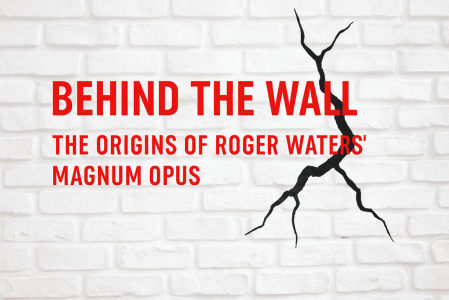Released in 1979, The Wall by Pink Floyd is one of the most influential concept albums in rock history. Known for its bold storytelling and rich soundscape, it pushed the limits of what a rock album could be.
At its heart, The Wall was born from Roger Waters’ deep sense of isolation, his troubled past, and a growing disillusionment with fame and society.
Personal Disillusionment
By the late 1970s, Pink Floyd was playing to massive crowds in packed stadiums. But for Roger Waters, the size of the shows created a growing sense of distance between the band and the audience. The music felt lost in the noise, and the connection he once had with fans began to fade.
The breaking point came during a show in Montreal in 1977. Frustrated by the chaos in the crowd, Waters spat at a fan near the stage. This moment shocked him. It made him realize how far he had drifted from the emotional core of his music. That incident sparked the idea of building a “wall” between himself and the world—a barrier that would become the heart of the album.
Themes of Isolation and Alienation
As Pink Floyd grew more successful, Roger Waters found himself feeling more alone. Fame brought pressure, not comfort. He struggled with the demands of the spotlight and felt emotionally cut off from the people around him—even his bandmates.
In response, Waters imagined a wall built from his fears, regrets, and painful memories. This wall became a powerful symbol of emotional isolation. Each song on the album adds another brick, showing how trauma and fame can shut a person off from the world. The Wall is not just a story about a rock star—it’s a look inside the mind of someone trying to escape their own pain.
Influence of Waters’ Childhood and Father’s Death
Roger Waters lost his father in World War II when he was just a baby. Though he never knew him, the absence left a lasting mark. His father’s death became a wound that never fully healed, shaping his view of war, authority, and loss.
In The Wall, this pain is woven throughout the narrative. The missing father figure creates a deep sense of abandonment in the main character, mirroring Waters’ own life. The album reflects his anger at the systems—both military and social—that he felt robbed him of a father and a sense of stability.
Band Dynamics and Internal Tensions
During the making of The Wall, tensions within Pink Floyd reached a peak. Roger Waters had begun to take more control over the band’s creative direction, often clashing with other members, especially keyboardist Richard Wright. Waters’ vision for the album was clear and personal, but it left little room for collaboration.
This power shift caused deep rifts. Wright was eventually forced out of the band during the album’s production. The Wall became as much a symbol of Waters’ control as it was a reflection of his inner struggles. While the album was a major success, it marked the beginning of the end for the classic Pink Floyd lineup.
Social and Political Commentary
The Wall is not only personal—it’s also political. Roger Waters used the album to criticize systems he saw as oppressive. One of the most famous songs, “Another Brick in the Wall, Part 2,” takes aim at harsh, controlling schools. Its message is clear: rigid education can crush creativity and self-worth.
Waters also reflected on post-war British society, shaped by loss, conformity, and discipline. He questioned the values passed down after the war—values that often left emotional scars. Through these themes, The Wall became a broader statement about how society builds barriers around people, not just within them.
Closing Thoughts
The Wall stands as a powerful blend of Roger Waters’ personal pain, artistic vision, and social critique. His feelings of isolation, the trauma of losing his father, the strain of fame, and his disillusionment with authority all shaped the album’s core. Each element added a new layer to its story and sound.
More than four decades later, The Wall still resonates. Its themes remain relevant, and its impact on rock music and live performance is undeniable. It’s not just an album—it’s a landmark in how music can explore the human condition.
